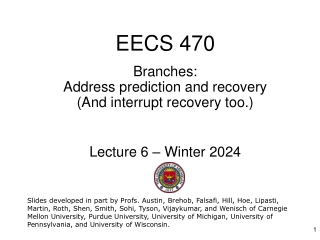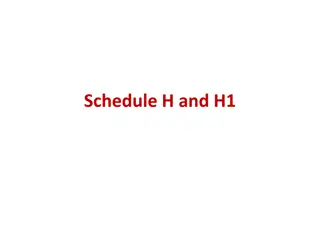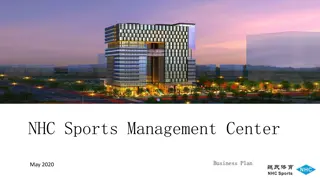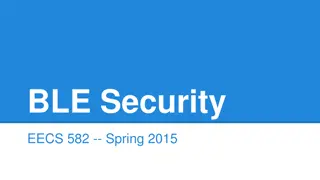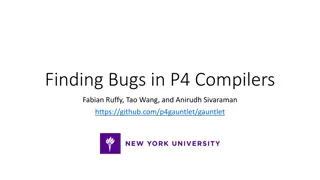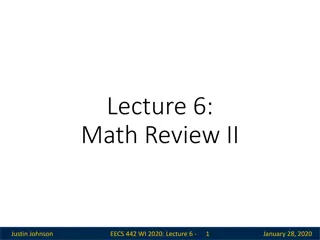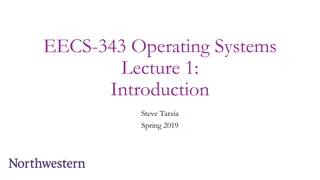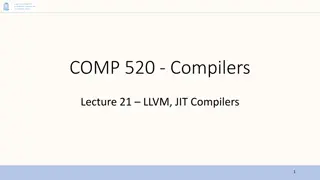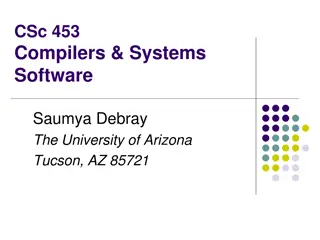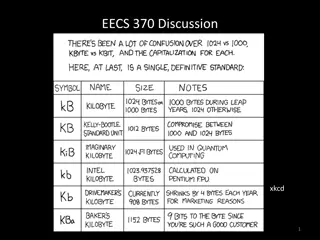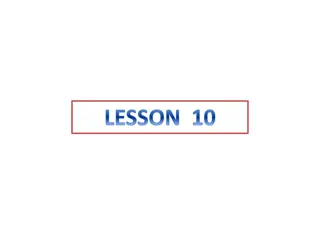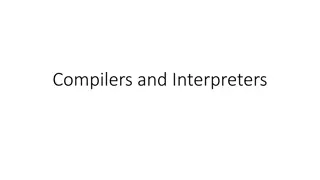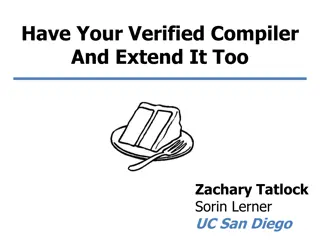EECS 583 Advanced Compilers Course Overview & Schedule Winter 2024
EECS 583 Advanced Compilers Course overview and schedule for Winter 2024 at the University of Michigan. Details about lecture and discussion class meetings, in-person and virtual attendance options, essential protocols, instructor information, and contact details. Learn about the course structure, virtual class participation guidelines, and faculty background. Stay informed about lecture timing, zoom access, office hours, and more.
Download Presentation

Please find below an Image/Link to download the presentation.
The content on the website is provided AS IS for your information and personal use only. It may not be sold, licensed, or shared on other websites without obtaining consent from the author.If you encounter any issues during the download, it is possible that the publisher has removed the file from their server.
You are allowed to download the files provided on this website for personal or commercial use, subject to the condition that they are used lawfully. All files are the property of their respective owners.
The content on the website is provided AS IS for your information and personal use only. It may not be sold, licensed, or shared on other websites without obtaining consent from the author.
E N D
Presentation Transcript
EECS 583 Advanced Compilers Course Overview, Introduction to Control Flow Analysis Winter 2024, University of Michigan Jan 10, 2024 https://web.eecs.umich.edu/~mahlke/courses/583w24
Lecture + Discussion Class meeting pattern Lecture: Mon/Wed 10:30-12:00 Scott office hours right after lecture: noon-12:30 Discussion: Wed 12:30-1:30, 1005 Dow (optional, some cancelled) Homework details, questions In-person lecture: G906 Cooley (White Auditorium) Try to attend, get more out of the lecture Please stay home if you are sick! May have some virtual classes during the semester Lecture will also be presented live on Zoom Participate from home if you wish Zoom videos also available (try to use just for review!) Bad idea if this is all you do: run 1.5x, multi-task, don t pay attention Discussion section is not recorded Zoom info Same link/password for all lectures, posted on course website Separate link for GSI office hrs more later - 1 -
Attending Class Virtually Lecture is synchronous and recorded Please try to attend live if you can We ll start at 10:35 sharp Keep your camera and mic muted Critical to avoid disruptions Asking questions on Zoom Type the word question in the chat box GSI will unmute you and you can ask question If you prefer not to speak, then just type out your question in chat and the GSI can ask it for you I will also pause regularly to ask if there are questions Discussion important in a grad class, so don t be bashful - 2 -
About Me Mahlke = mall key But just call me Scott Been at Michigan since 2001 Compiler guy who likes hardware Program optimization to make programs go faster Building custom hardware for high performance/low power Before this HP Labs in Silicon Valley Before before Grad student at UIUC Before ^ 3 Undergrad at UIUC - 3 -
More About Me 3 kids 7, 7, and 5 So if I show up to lecture half asleep, you know why! - 4 -
Contact Information Email: mahlke@umich.edu Office hours Mon/Wed 12:00-12:30 right outside lecture room Or send me an email for an appointment Visiting office hrs Mainly help on classroom material, concepts, etc. I am an LLVM novice, so likely I cannot answer any non-trivial question See GSIs for LLVM details - 5 -
583 GSIs Yunjie Pan (panyj@umich.edu) Office hours: Mon 1-3pm, Tue 1-3pm, Wed 1:30-3:30pm Aditya Vasudevan (adivasu@umich.edu) Office hours: Tue 3-5pm, Thu 3-5pm, Fri 10am-12pm Location: Zoom (link on course website, same link for the entire semester, same for both GSIs, passcode = eecs583) - 6 -
Getting Help from the GSIs LLVM help/questions But, you will have to be independent in this class Read the documentation and look at the code Come to them when you are really stuck or confused They cannot and will not debug your code Helping each other is encouraged Use the class piazza group (GSIs will monitor) Virtual office hours on Zoom Will offer a combination of appointments (EECS 583 calendar) and open slots. Details posted on piazza. - 7 -
Class Overview This class is NOT about: Programming languages Parsing, syntax checking, semantic analysis Handling advanced language features virtual functions, Frontend transformations Debugging Simulation Compiler backend Mapping applications to processor hardware Retargetability work for multiple platforms (not hard coded) Work at the assembly-code level (but processor independent) Speed/Efficiency How to make the application run fast Use less memory (text, data), efficiently execute Parallelize, prefetch, optimize using profile information - 8 -
Background You Should Have 1. Programming Good C++ programmer (essential) Linux, gcc, emacs (vi or other editor is ok too) Debugging experience hard to debug with printf s alone gdb! Compiler system not ported to Windows 2. Computer architecture EECS 370 is good, 470 is better but not essential Basics caches, pipelining, function units, registers, virtual memory, branches, multiple cores, assembly code 3. Compilers Frontend stuff is not very relevant for this class, but good to know Basic backend stuff we will go over fast Non-EECS 483 people will have to do some supplemental reading - 9 -
Textbook and Other Classroom Material No required text Lecture notes, papers LLVM compiler system we will use version 17.0.6 LLVM webpage: http://www.llvm.org Read the documentation! LLVM users group Course webpage + course newsgroup https://www.eecs.umich.edu/~mahlke/courses/583w24 Lecture notes available the night before class Piazza ask/answer questions, GSIs and I will try to check regularly but may not be able to do so always http://www.piazza.com - 10 -
What the Class Will be Like Core backend stuff Text book material some overlap with 483 2 homeworks to apply classroom material Research papers Last 1/3rdof the semester, students take over Select paper related to your project Each project team - presents 1 paper. 15 min talk + Q&A. Entire class is expected to watch presentations and grade presentations You will need to attend live for at least your own presentation - 11 -
What the Class Will be Like (2) Learning compilers No memorizing definitions, terms, formulas, algorithms, etc Learn by doing Writing code Substantial amount of programming Fair learning curve for LLVM compiler Reasonable amount of reading Classroom Attendance Best to join live, lots of examples solved in class Discussion important Work out examples, discuss papers, etc Essential to stay caught up Extra meetings outside of class to discuss projects - 12 -
Course Grading Yes, everyone will get a grade Grad class: Most (hopefully all) will get A s and B s Poor grades on homeworks are big problem Components Midterm exam 25% Project 45% Homeworks 15% Paper presentation 10% Class participation 5% - 13 -
Homeworks 1 preliminary (HW0), available on course webpage now Get LLVM set up, nothing to submit 2 real homeworks 1 small &1 harder programming assignment Design and implement something we discussed in class Goals Learn the important concepts Learn the compiler infrastructure so you can do the project Grading Working testcases?, Does anything work? Level of effort? Working together on the concepts is fine Make sure you understand things or it will come back to bite you Everyone must do and turn in their own assignment - 14 -
Projects Most Important Part of the Class Design and implement an interesting compiler technique and demonstrate its usefulness using LLVM Topic/scope/work 3-5 people per project (Other group sizes allowed in some cases) You will pick the topics (I have to agree) You will have to Read background material Plan and design Implement and debug Deliverables Working implementation Project report: ~5 page paper describing what you did/results 15 min presentation at end (demo if you want) Project proposal (early March) scheduled with each group during semester - 15 -
Types of Projects New idea Small research idea Design and implement it, see how it works Extend existing idea Take an existing paper, implement their technique Then, extend it to do something small but interesting Generalize strategy, make more efficient/effective Implementation Take existing idea, create quality implementation in LLVM Try to get your code released into main LLVM system Using other compilers/systems (GPUs, JIT, mobile phone, etc.) is possible - 16 -
Topic Areas (You are Welcome to Propose Others) Automatic parallelization Loop parallelization Vectorization/SIMDization Transactional memories/speculation Breaking dependences Memory system performance Instruction/data prefetching Use of scratchpad memories Data layout Reliability Catching transient faults Reducing AVF Customized hardware High level synthesis HW optimization Power Instruction scheduling techniques to reduce power Identification of narrow computations Streaming/GPUs Stream scheduling Memory management Optimizing CUDA programs Security Program analysis to identify vulnerabilities Eliminate vulnerabilities via xforms Dynamic optimization DynamoRIO Run-time optimization - 17 -
Class Participation Interaction and discussion is essential in a graduate class Try to join live if you can (not required) If you are here, don t just stare at the wall Be prepared to discuss the material Have something useful to contribute Opportunities for participation Research paper presentations thoughts, comments, questions Saying what you think during class or in project discussions outside of class Lectures: Solving class problems, asking questions Helping answer questions on piazza! - 18 -
Class Schedule (on course website) Week Date Topic 1 Mon Wed 2 - Jan 10 Jan 15 Jan 17 Jan 22 Jan 24 Jan 29 Jan 31 Feb 5 Feb 7 Feb 12 Feb 14 Feb 19 Feb 21 Feb 26 Feb 28 Mar 4 Mar 6 Mar 11 Mar 13 Mar 18 Mar 20 Mar 25 Mar 27 Apr 1 Apr 3 Apr 8 Apr 10 Apr 15 Apr 17 Apr 22 - Apr 23-29 Course intro, Control flow analysis, HW #0 out No class, MLK Day Control flow analysis, HW #0 due (nothing to turn in), HW #1 out Control flow analysis Control flow analysis Dataflow analysis, HW #1 due Dataflow analysis, HW #2 out SSA form Code optimization Code optimization Code generation Code generation Code generation, HW #2 due No class, Spring Break No class, Spring Break Code generation Code generation No regular class - Project proposals No regular class - Project proposals Midterm Review Midterm Exam Research paper presentations Research paper presentations Research paper presentations Research paper presentations Research paper presentations Research paper presentations Research paper presentations Research paper presentations No regular class Finish projects 3 4 5 6 7 8 9 10 11 12 13 14 15 16 Project demos - 19 -
Target Processors: 1) VLIW/EPIC Architectures VLIW = Very Long Instruction Word Aka EPIC = Explicitly Parallel Instruction Computing Compiler managed multi-issue processor Desktop IA-64: aka Itanium I and II, Merced, McKinley Embedded processors All high-performance DSPs are VLIW Why? Cost/power of superscalar, more scalability TI-C6x, Philips Trimedia, Starcore, ST-200 - 20 -
Target Processors: 2) Multicore Sequential programs 1 core busy, 3 sit idle How do we speed up sequential applications? Switch from ILP to TLP as major source of performance Memory dependence analysis becomes critical - 21 -
Target Processors: 3) SIMD/GPU Do the same work on different data: GPU, SSE, etc. Energy-efficient way to scale performance Must find vector parallelism - 22 -
So, lets get started Compiler Backend IR Our Input Variable home location Frontend every variable in memory Backend maximal but safe register promotion All temporaries put into registers All local scalars put into registers, except those accessed via & All globals, local arrays/structs, unpromotable local scalars put in memory. Accessed via load/store. Backend IR (intermediate representation) machine independent assembly code really resource indep! aka RTL (register transfer language), 3-address code r1 = r2 + r3 or equivalently add r1, r2, r3 Opcode (add, sub, load, ) Operands Virtual registers infinite number of these Literals compile-time constants - 23 -
First Topic: Control Flow Analysis Control transfer = branch (taken or fall-through) Control flow Branching behavior of an application What sequences of instructions can be executed Execution Dynamic control flow Direction of a particular instance of a branch Predict, speculate, squash, etc. Compiler Static control flow Not executing the program Input not known, so what could happen Control flow analysis Determining properties of the program branch structure Determining instruction execution properties - 24 -
Basic Block (BB) Group operations into units with equivalent execution conditions Defn: Basic block a sequence of consecutive operations in which flow of control enters at the beginning and leaves at the end without halt or possibility of branching except at the end Straight-line sequence of instructions If one operation is executed in a BB, they all are Finding BB s The first operation in a function starts a BB Any operation that is the target of a branch starts a BB Any operation that immediately follows a branch starts a BB - 25 -
Identifying BBs - Example L1: r7 = load(r8) L2: r1 = r2 + r3 L3: beq r1, 0, L10 L4: r4 = r5 * r6 L5: r1 = r1 + 1 L6: beq r1 100 L3 L7: beq r2 100 L10 L8: r5 = r9 + 1 L9: jump L2 L10: r9 = load (r3) L11: store(r9, r1) ?? - 26 -
Control Flow Graph (CFG) Defn Control Flow Graph Directed graph, G = (V,E) where each vertex V is a basic block and there is an edge E, v1 (BB1) v2 (BB2) if BB2 can immediately follow BB1 in some execution sequence A BB has an edge to all blocks it can branch to Standard representation used by many compilers Often have 2 pseudo vertices entry node exit node Entry BB1 BB2 BB3 BB4 BB5 BB6 BB7 Exit - 27 -
CFG Example B1 x = z 2; y = 2 * z; if (c) B2 else B3 x = z 2; y = 2 * z; if (c) { x = x + 1; y = y + 1; } else { x = x 1; y = y 1; } z = x + y then (taken) else (fallthrough) B2 B3 x = x 1; y = y 1; goto B4; x = x + 1; y = y + 1; B4 z = x + y - 28 -
Weighted CFG Profiling Run the application on 1 or more sample inputs, record some behavior Control flow profiling edge profile block profile Path profiling Cache profiling Memory dependence profiling Annotate control flow profile onto a CFG weighted CFG Optimize more effectively with profile info!! Optimize for the common case Make educated guess Entry 20 BB1 10 10 BB2 10 BB3 10 BB4 20 0 BB5 BB6 20 0 BB7 20 Exit - 29 -
Property of CFGs: Dominator (DOM) Defn: Dominator Given a CFG(V, E, Entry, Exit), a node x dominates a node y, if every path from the Entry block to y contains x 3 properties of dominators Each BB dominates itself If x dominates y, and y dominates z, then x dominates z If x dominates z and y dominates z, then either x dominates y or y dominates x Intuition Given some BB, which blocks are guaranteed to have executed prior to executing the BB - 30 -
Dominator Example 1 Entry BB1 BB2 BB3 BB4 Exit - 31 -
Dominator Example 2 Entry BB1 BB2 BB3 BB4 BB5 BB6 BB7 Exit - 32 -
Get Started ASAP!! Homework 0 Go to http://llvm.org Setup LLVM 17.0.6 on the class server or your favorite Linux box For server, use the central version that is already set up For your own system, read the installation instructions See Aditya s post on piazza for detailed instructions Try to run it on a simple C program HW1 goes out next week and you need LLVM We will have 2 dedicated servers for class use eecs583a/eecs583b.eecs.umich.edu Everyone should have ssh access - 33 -


